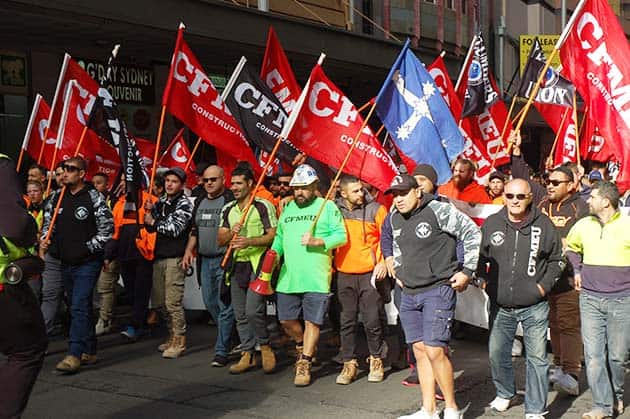Thousands walked off construction sites around the country on 20 June as the CFMEU construction union took its second national day of action against the Australian Building and Construction Commission (ABCC) and the new Construction Code. Many were defying anti-strike laws that deem such action “illegal” and punishable by fines.
“It’s a good showing to the government that we mean business and we won’t be walked over and dictated to,” as one CFMEU delegate in Sydney told Solidarity.
The action itself was a major show of force with numbers growing since the last CFMEU day of action in March. In Melbourne 20,000 workers took to the streets and shut down the CBD, 10,000 marched through Sydney and at least 500 marched on the office of federal Employment Minister Michaelia Cash in Perth. In Brisbane 4000 swarmed the ABCC headquarters in the CFMEU’s sixth major action in seven months. Opposition industrial relations spokesman Jarrod Bleijie even complained Queensland had become the “strike capital of Australia”.
The action hit construction bosses hard. The Queensland Master Builders Association (MBA) said that every big CFMEU day of action costs employers at least $8 million state-wide. The Victorian MBA said over 100 construction projects were shut down.
Workers were particularly angry about pressure to re-negotiate their agreements to comply with Turnbull’s construction Code. On 1 September companies without ode compliant EBAs will be blacklisted from government work. This is designed to force compliance through denying access to billions in lucrative contracts. Code compliance would mean giving up many avenues for union access to sites, opening the door to labour-hire and greater casualisation and even giving up the right to fly union flags.
Luke Hilakari from the Victorian Trades Hall Council told the Melbourne rally that the ABCC was “devastating legislation” that led to the deaths of 330 workers last time it was introduced. CFMEU Secretary John Setka damned the ABCC as, “an attack dog for the government-driven zealots who hate unions and workers in general”. The ABCC gives anti-union inspectors star chamber powers, takes away workers’ right to silence and threatens them with six months’ jail if they refuse to co-operate with investigations.
Deadline looms
Tensions are ratcheting up further as the deadline for Code compliance approaches. Companies are currently in a “transition period” where they can tender for government work regardless of Code compliance, but they cannot be awarded work unless they have compliant agreements.
Building material giant Boral has taken a hard line to try and force its workers to accept a Code compliant agreement. At its NSW concreting subsidiary, De Martin & Gasparini, Boral threatened to sack 110 workers if they refused to sign a new EBA. Bosses have threatened that “all existing EBA employees could be made redundant”. But the code friendly agreement was voted down 64 to 34. According to CFMEU National Secretary Dave Noonan the agreement would have removed a guaranteed six weeks off per year and the right of casuals to permanent jobs after six weeks’ work.
However, further action will be essential to hold the line. The CFMEU has pledged to oppose new Code compliant agreements, as at Boral.
But the Financial Review has cited “industry sources” claiming that the CFMEU has begun to negotiate on new agreements with some companies in every state except Queensland.
Other unions such as the AWU and AMWU are accepting new Code compliant agreements, and major builder John Holland boasts that all its agreements already comply with the Code.
In a setback, Lendlease Engineering NSW ambushed workers to push through a compliant agreement in June. The CFMEU opposed the agreement but Lendlease used a sneaky long-weekend ballot of its unionised workforce to narrowly pass the agreement with 50 votes out of 96.
When parliament resumes in August a Senate disallowance motion against the Code may be a focus for further CFMEU actions. Every union needs to pull out stops to show support.
By Adam Adelpour






